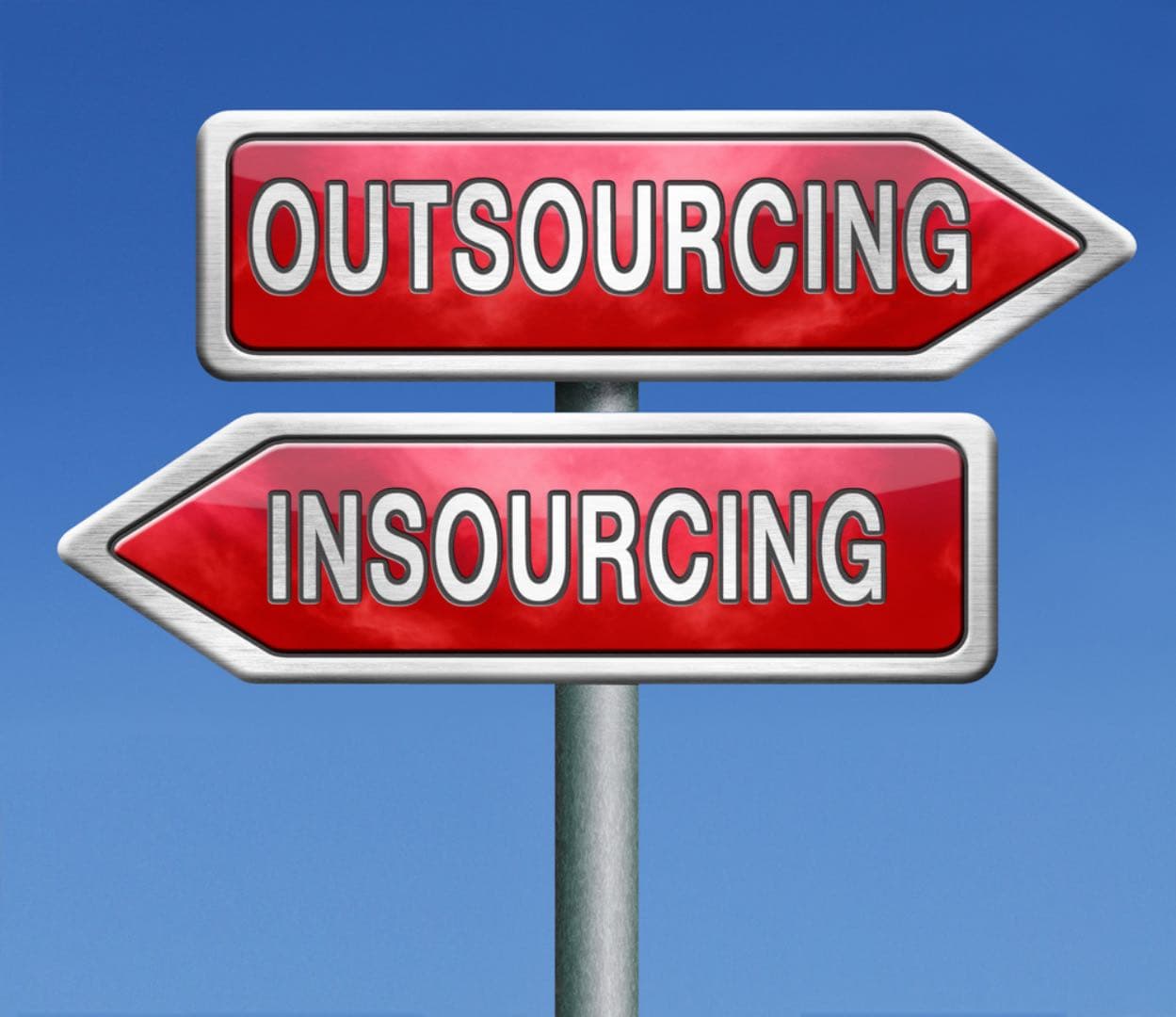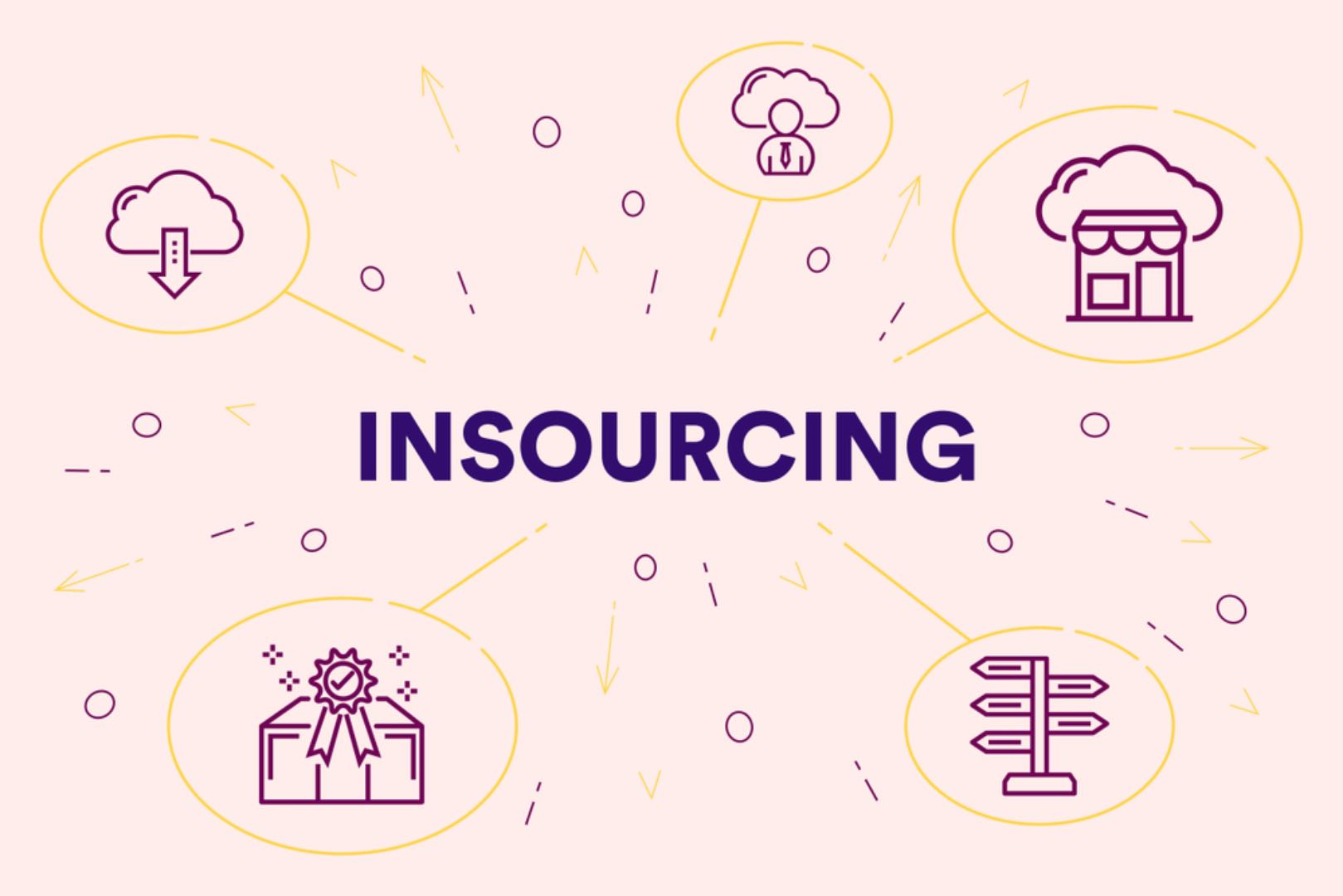To insource digital-marketing needs or outsource them?
This is the typical question for many businesses, regardless of size.
Both have their benefits. But after two decades of experience that includes positions as an employee and employer, outsourcing has continually claimed the dominant hand.
Here’s why, explained from two perspectives:
- As head of content and business development for a few companies and agencies.
- As a freelancer and agency owner, the latter one who also outsources content and SEO work.

Positives of Outsourcing Digital Marketing
The Big One: Money
When discussing product or service pricing, money talk is always the proverbial elephant in the room.
Many businesses won’t provide prospects any cost numbers until the end of a conversation – regardless if that conversation lasts three minutes or three months.
But when hiring, money talk takes on a much different story. Most businesses will set a hiring budget for their digital marketing needs and spend little time researching the talent needed to move the company forward.
This poor research typically leads to a bloated in-house staff. Don’t think this only occurs in startups; some of the most respected companies remain bloated.
Bloating kills profit margins. But this scenario could have been quickly diverted by outsourcing, which can save thousands of dollars every month due to cutting some major costs.
One example is when I was heading content creation for the marketing department of a pet company, which was then a Fortune 500 company. The marketing department had 10 entry-level marketers basically doing the work of two.
Quick math – even if each person was earning $35,000 a year, that’s $350,000 yearly in salary – not including benefits, paid time off, holiday pay, and expensive cross-country trips to sharpen that saw.
If the company was willing to outsource, a reputable agency would have costs around $10,000 to $15,000 monthly – and that’s thinking in modern prices for multiples services, from content marketing to SEO to PR to paid search (not including paid budget, of course!).
That company is still going but got surpassed by multiple competitors, two of which I freelanced for that outsourced their entire marketing needs.
Outsourcing simply saves money, all while providing further benefits.

More Expertise
When insourcing a digital marketing staff, many companies can’t afford top talent. This results in a staff of entry-level marketers.
Sure, the ones with the proper attitude and aptitude will grow, but this is not the usual case.
Reputable agencies are typically loaded with the best possible talent – especially those agencies that rely on outsourcing.
My agency has 30+ copywriters, each one hand-picked and matched to a client. If my agency doesn’t have a copywriter to match a client, I’ll do everything to find the correct one. Same goes for SEO – my agency only works with top brass, and matches each one to the client.
This is client-forward thinking; each client is matched with only the best talent, which provides endless value. And it all occurs at a fraction of what an in-house, expert-level staff would cost.
Easier to Manage, Less Headaches
When a company outsources their digital marketing needs, there’s minimal management. The agency (remember, not a hack agency) takes care of this, which lessens the headaches of everyone from the CEO to the sales team.
With less worrying about what’s going on in-house, the C-level execs can focus more on important things, like business development or creating an agenda to polish the sales team.

Quick side note: make sure your sales team always works closely with your outsourced digital marketing agency, especially on the content side. When sales and content unite, the results are magical.
I’ve worked with a few agencies that refused to get involved with a client’s sales team. This should be a giant red flag for the client.
When outsourcing to an agency, there is also a lack of delegation. This is directed at the in-house “head ofs” (e.g., head of content, head of PPC, or head of whatever).
Task delegation takes time, and if not properly executed, can quickly diminish the original effort.
The problem with in-house “head ofs” is most are either:
- Entry level.
- Pressured for “small” projects by other departments.
- Not challenged enough due to those below or above them.
This all leads to a lack of focus, added pressure, or boredom – any of these elements lead to sloppy delegation. This worsens because when tasks are not properly delegated, these “head ofs” end up completing the work themselves, which puts a pause on long-term term strategy and long-term growth.
When a company hires a digital marketing agency, the CEO or whomever only delegates one thing – the digital marketing. Again, this provides fewer headaches and allows everyone to focus on what they’re supposed to focus on based on their positions.
With That Said, Insourcing Does Have Some Upsides…
The benefits of outsourcing digital marketing to an agency are plentiful. But there are some upsides to insourcing the work.
One huge positive of hiring an in-house digital marketing team is that they will be submerged in the company’s culture. Each in-house worker can unite to help strengthen the company’s story.
For companies built around nothing but passion for their products (think Apple or Ducati), the leadership teams will do whatever is needed to find talent that reflects these same sentiments for the brand. When the proper players are united, the efforts are well worth the outcome.
Also, an in-house staff can stray from strict “deliverables” that are typically set in the contract of any agency.
Take content creation; maybe an agency will hire a content team to create 15 blogs per month and ghostwrite a few guest blogs for other websites within their niche to build some strong links.

If this is under contract, an agency will stick to the terms, even if its client has a need to prioritize other items, such as adding content on some pages; creating entirely new pages for new products/services; or focusing on social efforts like writing LinkedIn stories or social posts.
This is what contracts are for – to have set deliverables in play, month-to-month, and stick with them. But sometimes that isn’t always the best route to success.
But with some different thinking, these positives of insourcing are possible with an outsourced agency.
In regards to company culture, companies should relentlessly seek agencies that are the correct fit. This means seeing through the BS of some agencies – especially the ones that are “me, me, me” centered and not client-centered.
Just because an agency hit gold with a shoe brand doesn’t mean they’ll have those same results with a finance client, for example.
Businesses should seek an agency that is client-centered and will match a digital marketing team around that businesses’ needs. This is why it helps if that agency also outsources – more talent is available to put together and match to their client’s needs.
As for contracted “deliverables,” this is also simple – include “flex hours.” This is something I learned while working via Eric Riles’ “Lean Startup” mode; I basically built my services around client needs.
Some clients needed much more than the contracted SEO or content marketing, and the needs were services my agency could provide, such as PR or business-development consulting. I eventually restructured contracts to include flex hours to replace some deliverables with whatever was needed.
Example – the flex hours will replace say five pieces of content with five or so hours of work monthly for whatever else is needed.
Clients love flexibility. But remember, all that flexibility must be measurable so that the agency doesn’t lose time or money.

Why Outsourcing Wins
Outsourcing digital marketing needs will save a company money, allowing quicker profitability and sustained growth — the typical goals of any business, from those selling paper cups to those selling $35,000 motorcycles.
There are upsides to in-house digital marketing, but from 20 years on both sides – working on marketing teams for businesses and as an agency owner – the benefits of outsourcing far outweigh those of insourcing.
Every situation will have its own unique set of variables. This is where the C-level execs must put their most efforts forward, and make the optimal decision when either outsourcing or insourcing digital marketing needs.
But if they decide to outsource, their mind will likely be freer to focus on the other elements that help with growth and profitability.
More Digital Marketing Resources:
Subscribe to SEJ
Get our daily newsletter from SEJ’s Founder Loren Baker about the latest news in the industry!
